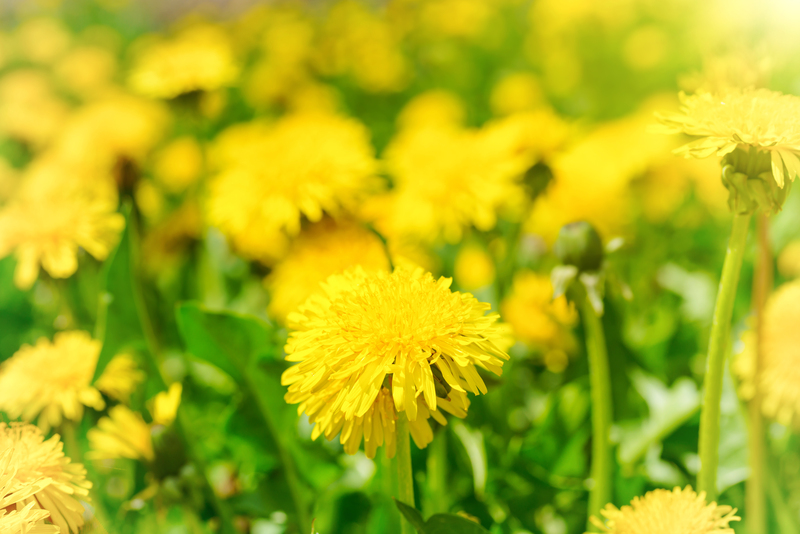Unleash Your Inner Gardener: 9 Essential Tips for Novices
Posted on 07/10/2025
If you've ever gazed at lush greenery and colorful blooms and wished your home or yard could look the same, you're not alone. Many dream of cultivating a stunning garden, but taking the first step can seem daunting. The good news is that discovering your green thumb isn't out of reach! Whether you have a sunny balcony, a cozy backyard, or a sunny windowsill, you can experience the joys of gardening. This comprehensive guide on unleashing your inner gardener brings you 9 essential gardening tips specifically curated for beginners. Read on and transform your space--indoors or out--into a flourishing oasis!
Why Start Gardening? Beginner's Inspiration
Before we dig into the practicalities, let's discuss why gardening is worth your while. For novices, gardening does more than beautify your environment:
- Boosts Mental Health: Caring for plants has proven stress-reducing and therapeutic effects.
- Enhances Physical Activity: Digging, planting, and watering is gentle exercise suitable for all ages.
- Promotes Sustainability: Growing your own food or flowers supports eco-friendly living.
- Brings Satisfaction: Watching seeds sprout and blooms unfold brings unmatched pride and joy.
No matter your reason, learning to garden is a rewarding journey. Let's unleash your inner gardener with these expert-approved, actionable tips!

1. Choose the Right Site: Sunlight and Space Matter
The foundation of a successful garden starts with the right location. As a novice gardener, observe your available space at different times of the day to determine sun patterns.
- Most vegetables, fruits, and flowers require 6-8 hours of sun daily.
- Shady areas are suitable for shade-tolerant species like ferns, hostas, and impatiens.
- Balconies, patios, or even sunny indoor windowsills can become productive gardens!
Tip: If you're unsure, start small with container gardening; you can move pots to follow the sun until you discover the perfect spot.
Gardening for Beginners: Pro Tip
An east- or south-facing area gets the most sunlight; this is ideal for most beginner-friendly plants.
2. Test and Improve Your Soil
A thriving garden needs healthy soil. Don't skip this critical step! Testing soil helps you understand its composition and what amendments it might need.
- Purchase an affordable soil test kit from a garden center.
- Alternatively, consult local cooperative extensions for professional analysis.
Common soil types are clay, sandy, silt, or loam. Each has unique drainage and nutrient characteristics.
- Clay soils hold nutrients well but drain poorly.
- Sandy soils drain quickly but retain fewer nutrients.
- Loam is considered ideal, balancing drainage and nutrient-holding capacity.
Improve your soil by adding organic matter like compost or well-rotted manure. Healthy, fertile soil is the secret underpinning every successful novice gardener's plot!
3. Select Easy-to-Grow Plants for Novices
Unleash your inner plant lover by choosing beginner-friendly species. Some plants practically thrive on minimal attention, making them perfect for first-time gardeners.
- Vegetables: Lettuce, radishes, carrots, beans, and tomatoes are reliable starters.
- Herbs: Basil, mint, rosemary, and parsley happily flourish on windowsills or outdoors.
- Flowers: Marigolds, sunflowers, cosmos, and nasturtiums brighten any patch or pot.
- Houseplants: Snake plant, pothos, and spider plants survive low-light and irregular watering.
Pro Tip: When shopping for plants, look for varieties labeled "easy", "beginner", or "hardy". Avoid delicate, high-maintenance specimens until you're more confident.
4. Equip Yourself With the Basic Gardening Tools
Having the right tools makes unleashing your inner gardener a pleasure rather than a chore. As a novice, you don't need elaborate equipment; just a few essentials will do:
- Hand trowel - for digging small holes and transplanting seedlings
- Garden gloves - to protect your hands from dirt and thorns
- Watering can or hose with gentle spray attachment
- Pruning shears - for trimming and guiding plant growth
- Rake - to clear debris and smooth beds (for outdoor gardens)
- Spade or shovel (for bigger projects)
Keep your tools clean and sharp to prevent spreading diseases and ensure effortless gardening. Store them in a dry place after use.
5. Water Wisely: Less Is Often More
Many beginner gardeners make the mistake of overwatering. Most plants prefer deep, infrequent watering over shallow, daily sprinkling.
- Water in the early morning or late afternoon to reduce evaporation.
- Check soils by sticking your finger in an inch; if it feels dry, water!
- Be mindful--overly soggy soil suffocates roots and encourages disease.
- Container plants dry faster and usually need more frequent watering.
Tip: Group plants with similar water needs together for easier care.
6. Learn the Art of Plant Spacing
Crowded plants compete for nutrients, sunlight, and air, leading to stunted growth and more pests. Before you plant, read the spacing recommendations on seed packets or plant tags.
Aim for healthy airflow and sufficient room for plants to develop fully. For example:
- Lettuce: 6-8 inches between plants
- Tomatoes: 18-24 inches apart
- Marigolds: 8-10 inches apart
Don't be tempted to cram seedlings together--they'll thank you later with more robust growth and bountiful harvests.
7. Regular Feeding: Fuel for Growth
Novice gardeners sometimes overlook the importance of feeding plants. However, even nutrient-rich soil can deplete over time. Supplement your garden with organic or slow-release fertilizers for healthy growth.
- Vegetables and flowering plants often need high-potassium and nitrogen-rich fertilizers during their main growing season.
- Compost tea or natural seaweed solutions offer gentle, organic boosts.
- Apply fertilizers exactly as directed--excess can damage plants.
Regularly feeding ensures your garden stays lush, green, and productive.
8. Keep Weeds and Pests at Bay
Weeds and pests can quickly overwhelm even the most enthusiastic beginner gardener. But with consistent, gentle attention, you can keep your plot healthy:
- Pull weeds as soon as you spot them to prevent spreading.
- Apply an organic mulch to smother weeds and retain soil moisture.
- Inspect your plants weekly for chewed leaves or insect pests.
- Encourage beneficial insects (like ladybugs) naturally control pests.
If you spot trouble, try non-toxic remedies like a gentle soap spray or hand-picking pests. Avoid harsh chemicals; they can harm pollinators and your plants!
9. Track Your Progress & Embrace Learning
Every novice gardener learns as they grow! Keep a simple journal or photo diary:
- Record what you planted and when.
- Note the weather, watering, and any problems that arise.
- Document successes, failures, and new techniques.
This process helps you learn faster and saddles you with valuable insights for next season.
Above all, don't be discouraged by mistakes! Gardening is an ongoing journey of discovery. The most beautiful gardens grew from patience, curiosity, and resilience.
Bonus: Connect With the Gardening Community
Being a novice gardener doesn't mean you're alone. Join local gardening clubs, visit plant nurseries, or participate in online forums and social media groups. Exchanging tips, seeds, and stories with fellow gardeners accelerates your growth and keeps you motivated.

Frequently Asked Questions for Beginning Gardeners
- How much time does gardening really require?
Start with as little as 10-15 minutes daily. As your garden and enthusiasm grow, you can increase your commitment! - What are the easiest vegetables for beginners?
Lettuce, radishes, green beans, and snap peas are reliable for first-time gardeners. - Can I unleash my inner gardener in a small space?
Absolutely! Container gardening and vertical planters are ideal for balconies, patios, or windowsills. - How can I avoid common beginner mistakes?
Start small, read plant labels, don't overwater, and learn as you go!
Unleash Your Green Thumb: Start Your Gardening Journey Today
It's never too early--or too late--to embrace garden life. By following these 9 essential tips for novice gardeners, you'll be well on your way to growing gorgeous plants, enjoying home-grown produce, and cultivating a lifelong passion. Unleash your inner gardener today and watch your confidence (and your plants!) flourish. Happy gardening!
Ready to dig in? Which tip will you start with? Share your gardening discoveries and tag us with #UnleashYourInnerGardener!
Latest Posts
Transform Your Lawn with These 3 Effective Weed Control Tips
Unleash Your Inner Gardener: 9 Essential Tips for Novices
Shaping Your Garden: Creative Hedge Trimming Techniques to Explore

